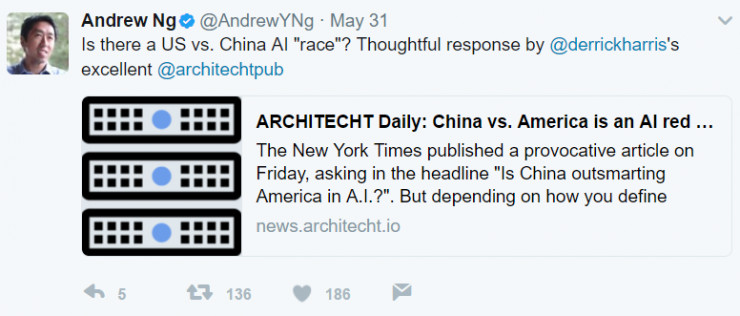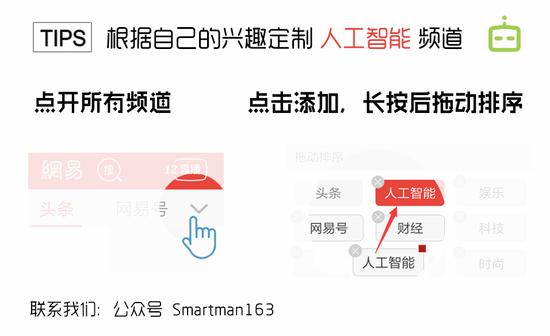(Original title: The United States considers restricting China’s investment in the AI ​​field and the Ministry of Foreign Affairs responds.)
June 15, Reuters released an article yesterday that current and former U.S. officials told Reuters that the U.S. is ready to step up its review of China’s investment in Silicon Valley companies so as to better protect sensitive technologies that are critical to U.S. national security. .
They are particularly concerned about China’s interest in areas such as artificial intelligence and machine learning. These industries have increasingly attracted the interest of Chinese capital investment in recent years. Research firm CB Insights reports that since the beginning of 2012, 29 investors from mainland China have invested in American artificial intelligence companies. They worry that the cutting-edge technology developed by the United States may be used by China to improve its military capabilities, and perhaps it will be promoted in the strategic industry.
The U.S. government is considering strengthening the role of the U.S. Foreign Investment Review Committee (CFIUS). The committee is responsible for examining the acquisition of foreign investment in U.S. companies from the perspective of national security. During President Obama’s term, CFIUS blocked China’s acquisition of high-end chip makers.
Reuters saw an unpublished Pentagon report warned that China is avoiding US scrutiny and has mastered sensitive technology through transactions that currently do not incur CFIUS review. Such transactions will include joint ventures, minority holdings, and early investments in startups.
Senate Republican No. 2 John Cornyn’s assistant stated that Cornyn is currently drafting legislation to give CFIUS more power to block investment in certain technologies. "Artificial intelligence is one of many advanced technologies that China is interested in, and it has potential military uses," said Cornyned, an assistant.
Chinese artificial intelligence is catching up with the United States?
In March 2016, AlphaGo was born and brought artificial intelligence to unprecedented attention.
The application prospects of artificial intelligence in the financial, medical, and auto-pilot areas have enabled tech companies to see hope. Giants such as Baidu, Alibaba and Tencent have already invested heavily. Frequent excavation is frequent and the value of AI personnel has skyrocketed.
According to Tencent Technology, they used Python reptiles to capture AI-related technical jobs on several major recruitment websites and found that for AI-related technical jobs, 300,000-600,000 annual salary is basically a relatively mainstream income level. In other technical positions, it is basically the income level of architects with more than 8 years of work experience. It can be seen that the degree of artificial intelligence in China is hot.
Of course, in addition to these giants such as BAT, many startup companies in the field of artificial intelligence, such as speech recognition, semantic understanding, and computer vision, have also emerged.
In addition to the industry, Chinese academic circles have also made remarkable achievements in artificial intelligence. According to the “National Artificial Intelligence Research and Development Strategic Plan†previously published by the White House, from 2013 to 2015, the articles of “deep learning†or “deep neural network†have increased by about 6 times in the papers collected by SCI. According to the number of articles, the United States is no longer the first in the world. After adding the condition that “Articles must be cited at least onceâ€, China surpassed the United States in both 2014 and 2015, ranking first.
In addition to technology companies, the Chinese government has also joined the forefront of this cutting-edge technology and increased its support for the artificial intelligence industry from a strategic perspective.
In July 2016, in the “Thirteenth Five-Year National Science and Technology Innovation Plan†issued by the State Council, artificial intelligence was included in the plan as a new generation of information technology.
On March 5, 2017, Premier Li Keqiang of the State Council mentioned in the government work report that it is necessary to speed up the cultivation and growth of emerging industries. Fully implement the strategic emerging industry development plan, accelerate the research and development and transformation of technologies such as new materials, artificial intelligence, integrated circuits, biopharmaceuticals, and fifth-generation mobile communications to enlarge and strengthen industrial clusters. This is the first time that "artificial intelligence" has been included in the government work report.
The rapid rise of China in the field of artificial intelligence, as well as the Chinese government’s emphasis on artificial intelligence, has also raised concerns in the United States.
According to news reports, on February 3 this year, the "New York Times" published "China Gains on the US in the Artificial Intelligence Arms Race" jointly written by Pulitzer Prize winner and senior science journalist John Markoff. Note: The article in the New York Times Chinese online titled "China's artificial intelligence catches up with the United States is not a dream". Markoff analyzed in his article that in the era of artificial intelligence, not only will people's lives change, AI will also pull the competition between countries in science and technology to a relatively equal starting line.
“Chinese leaders are thinking more and more about how to ensure that they are competitive in the next wave of technology,†said Adam Segal, an expert on emerging technologies and national security issues at the Council on Foreign Relations.
The “New York Times†article also mentioned another competitive advantage of China. Silicon Valley and China have close links in investment and research. The openness of the American AI research community also means that the most advanced technologies can be easily used by China. . And Baidu, Ali, Tencent, and Xunfei have all been deployed in the United States to recruit talent.
In addition to the New York Times, the Wall Street Journal also published an article stating that “China has provided more funds and policies to support their artificial intelligence startups than other countries. In addition, startups from China are also from the capital. There is more investment in the market. Under all support, the government may be able to foster these technologies in Internet censorship or other areas; for artificial intelligence buyers, artificial intelligence is that they are fierce with multinational companies. The most sophisticated solution in the competition."
Not only restrict investment, but also retain top Chinese students?
Concerned by China, the United States is not only considering restricting investment from China, but also preparing to revise its policy to retain top Chinese students.
"The New York Times" stated that "At present, cooperation and exchanges between artificial intelligence in China and the United States are basically open, at least in the United States. The Chinese scholars of the aesthetics will publish research results in journals that are open to all, from China. Researchers play an important role in U.S. research institutions."
According to a report from Reuters, the Pentagon’s report suggested that a list of key technologies be compiled to limit China’s investment in listed items and proposes to strengthen anti-espionage operations. In addition, the report also suggests that it is necessary to take measures outside the U.S. military, including amending the immigration policy so that Chinese graduate students can remain in the United States after completing their studies, rather than returning home with their acquired knowledge.
Venky Ganesan, general manager of Menlo Futures, also believes it is necessary to keep the best and brightest students in the United States.
"One of the most important things we can do is to nail their green cards to their diplomas so that they can stay and develop technology here instead of going back to their country and competing with us," said Ganesan.
Not a zero-sum game

Regarding the AI ​​dispute between China and the United States, Wu Enda, a Chinese leader in artificial intelligence, also expressed his opinions. In a recent Twitter post, he recommended Derrick Harris's article "China vs. America is an AI red herring." Wu Enda said, “Is there really a 'China-US AI competition'? Derrick Harris’s response is very insightful.â€
Derrick Harris believes that "The New York Times article has more to do with AI-independent content, and deep computer science research such as supercomputing and quantum computing is the content of this discussion. When we talk about the consumer of enterprise AI, China It is more like a fruit salad than the United States. It is the relationship between apples and oranges."
In addition, Derrick Harris also quoted the views of Bradford Cross, an experienced investor and entrepreneur. Bradford Cross believes that when it comes to consumer-level AI, China is indeed more innovative than the United States. However, he does not think that China will dominate the AI ​​field and even the world. He suggested that U.S. companies do just what American consumers need for AI products.
Derrick Harris said that
In fact, many academic institutions and even commercial funded AI research are open. The groundbreaking work actually came from Canadian universities (those wishing to become AI centers) and Google’s DeepMind department, which is linked to Oxford University. Of course, Google and Baidu often publish papers to record their innovation in the AI ​​field.
This is not a zero-sum game.
In addition, at a regular news conference of the Ministry of Foreign Affairs yesterday, Ministry of Foreign Affairs spokesperson Lu Hao responded that “normal commercial M&A should be conducted in accordance with commercial principles and market rules. We advocate that the outside world should not be excessive to these commercial M&A cases. Political interpretations, let alone political interference, are essentially mutual benefit and win-win, and we hope that the United States can provide a good environment for Chinese companies to invest in the United States.Facts have proved that there is a good trade and investment cooperation between China and the United States. Relations can bring tangible benefits to both parties."
 燑br>
燑br>
Sexual Enhancement Capsule,Long Time Sex Capsule,Fast Erection Capsule,Sex Power Capsule
Nanning Goodman Technology Co.,Ltd , https://www.goodmentech.com